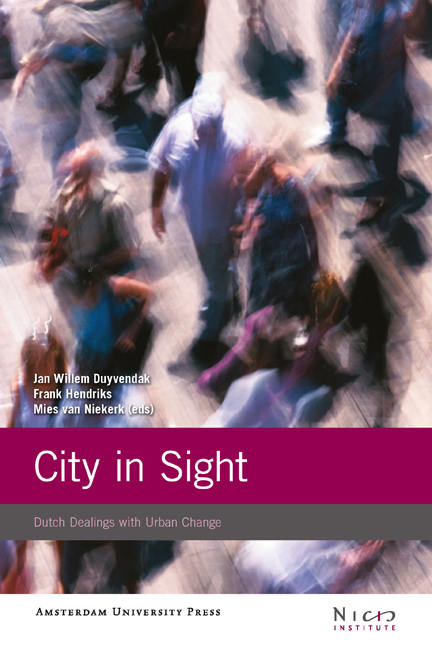Book contents
- Frontmatter
- Contents
- Acknowledgements
- Cities in Sight, Inside Cities: An Introduction 9
- Part I Urban Transformations and Local Settings
- Part II Urban Citizenship and Civic Life
- Part III Urban Governance and Professional Politics
- The Dutch Orange and the Big Apple: A Comparative Commentary
- References
- Notes on Contributors
- Index
7 - Organize Liberal, Think Conservative: Citizenship in Light Communities
Published online by Cambridge University Press: 19 January 2021
- Frontmatter
- Contents
- Acknowledgements
- Cities in Sight, Inside Cities: An Introduction 9
- Part I Urban Transformations and Local Settings
- Part II Urban Citizenship and Civic Life
- Part III Urban Governance and Professional Politics
- The Dutch Orange and the Big Apple: A Comparative Commentary
- References
- Notes on Contributors
- Index
Summary
Analyzing civic engagement is often a nostalgic affair. Prominent points of reference are either the 1950s and its robust communities of dutiful citizens or the 1960s and the contentious action of rights-aware citizens. In the following, I try to construct a nostalgic-free take on civic engagement in the Netherlands in the early 21st century. Using a dataset of very loosely organized Dutch citizen groups, I demonstrate that the well-behaved practice of the dutiful citizen and the critical practice of the emancipated citizen are both alive and well, and often in the same person or the same community. I argue that civic engagement can be understood as a layered practice with sediments of both an obedient and a critical vocabulary. Modern citizenship is traditional in content and new in organization. ‘Less weight, more embedding’ appears to be the strategy by which a rather modest, social citizenship renews itself in light communities.
Variations of nostalgia
The picture of citizens disengaging from civic engagement and the subsequent social disastrous effects has a strong appeal to theorists of civil society and empirical researchers alike (Putnam 2000, 2004, 2007; Habermas 1992; Lane 2000; Walzer 1998). Citizens increasingly part from their capacities or their goodwill to create and maintain meaningful collectives. These meaningful collectives can be ‘civic associations’ in the ‘neo tocquevillian’ vocabulary, the clubs and organizations in which citizens meet on a regular basis to work on public affairs (Putnam 2000; Skocpol 2003; Bellah et al. 1996 [1985]). Or they can be the more abstract ‘community’ or ‘communities’ in the moral language of the culture critics, where a shared sense of ‘we’ is maintained (Etzioni 1996; Bauman 2000; Scheffer 2007). Where these meaningful collectives lack, so the reasoning goes, society's health is at stake, because it is in these robust communities that citizens learn and perform the duties that keep society alive.
Predominantly American as all these examples may be, they express the fears, feelings and perceptions of Dutch politics alike when the need to reinstate ‘values and norms’ or to reinvent ‘a new we’ are debated. Or, as Amsterdam mayor Cohen would have it in a speech at Leyden University: ‘We are more and more a society of individuals living separate lives.
- Type
- Chapter
- Information
- City in SightDutch Dealings with Urban Change, pp. 141 - 158Publisher: Amsterdam University PressPrint publication year: 2009



